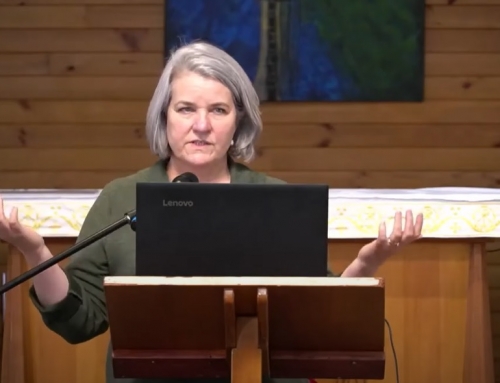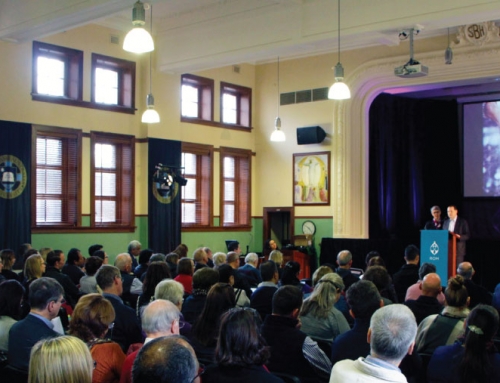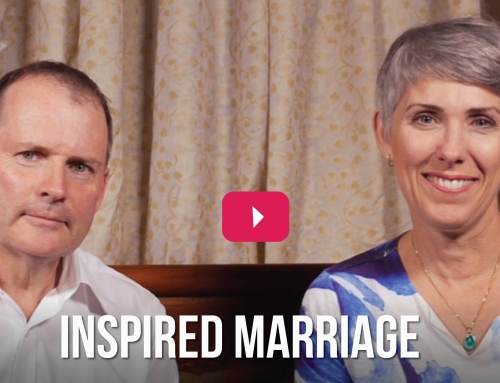To read original Q&A post click here
This week we are pleased to feature a Q&A with a former keynote presenter at Renaissance of Marriage – Dr Gregory and Lisa Popcak. Gregory Popcak is the organizer of the upcoming Symposium on Catholic Family Life and Spirituality, a July meeting at the University of Notre Dame focused on the renewal of family life. Greg, the director of Pastoral Solutions Institute, radio host, and author, talks about the scope and the goals.
Notre Dame symposium brings together theologians, social scientists to discuss family
- Kathryn Jean Lopez | Originally published in Crux, it is presented here with the author’s permission.
Lopez: You’re putting together a Symposium on Catholic Family Life and Spirituality. What’s the plan and the hope – and the prayer?
Popcak: Let me say this up front: We are not hosting a conference. My partners and I intend to use this event to launch a movement that will facilitate the renewal of Catholic family life. I know, that sounds ambitious in the extreme, and if I were attempting this myself, the assertion would be insane. Thankfully, we have some terrific collaborators. My organization, the Pastoral Solutions Institute, is working with the OSV Institute, Holy Cross Family Ministries, and the McGrath Institute for Church Life at the University of Notre Dame to gather an internationally recognized group of theologians, social-scientists, and pastoral ministry professionals to examine several critical questions about Catholic family life that, believe it or not, have never really been sufficiently explored, much less in a systematic way, in the history of the Church.
What do you hope to contribute to the broader Church and culture with this event?
Specifically, we’re looking at four questions.
First, are Catholic families called to be different from other families in some way? Should our faith inform the way Catholic families relate to each other in our homes? If so, how?
Second, what does a domestic-church-based spirituality actually look like? Most of what we think of as “Catholic spirituality” is drawn from the monastic and clerical traditions, and much of it just doesn’t fit with messy family life. How can families more meaningfully experience God at home? How can family life, itself, be a path to holiness?
Third, how can we help Catholic homes be forges of intentional discipleship and empower parents to raise up the next generation of faithful, fruitful disciples?
And finally, how can we empower families to be what the Church says they are meant to be: the primary outposts of evangelization and positive social change?
We believe the Church must stop simply ministering to families and start empowering families for ministry.
In your ministry and practice, what do you hear most from family life that if addressed could have a real impact?
People need to stop thinking of family life as an accessory – something we acquire – and rediscover the fact that family life, itself, is an activity (in fact, it’s a ministry). It is something that requires a daily, intentional investment of time and energy to thrive. Family life doesn’t “just happen” in the ten minutes we have with our kids as we drive them from school to the next activity. We can’t pass on our faith and values if our children only ever see the backs of our heads.
I’m not being nostalgic when I say that it was only a few short generations ago that parents only permitted children to be involved in activities to the degree that they didn’t conflict with the family meal, church attendance, and maybe even a family game night or a Sunday family day out together. Sadly, in the third generation of the culture of divorce, we’ve redefined family to mean, “any group of people living under the same roof and sharing a data plan.” We have reduced the family dynamic to one characterized solely by parallel play.
The Church teaches that the family is meant to be the “basic unit of society.” Well, if we really believe that, and if we really want to have any kind of positive impact on the world, we need to start by reminding people what a healthy, vibrant, cohesive family life actually looks like and empowering people to live it out. We believe that God wants to use his faithful families to change the world and renew the Church (which, in case you haven’t noticed, could use some help these days). We want to help families be what they are-salt and light.
What is Catholic family life today and what can it be?
If statistics are to be believed, most Catholic families are largely indistinguishable from any other kind of family. It’s true that families of all faiths who attend church service regularly are both more stable and generally happier than other families. That’s also true of Catholic families. But when it comes to family’s experience of life at home, the faith doesn’t appear to make much of a difference for Catholics. According to a 2015 Holy Cross Family Ministries/CARA study, 83 percent of Catholic families don’t pray together. Ever. In fact, the same study showed that only 13 percent of Catholic families regularly say grace at meals together.
As my wife and I discuss in our book, Discovering God Together: The Catholic Guide to Raising Faithful Kids, research on faith transmission tells us that kids are most likely to own their faith into adulthood when they can say they experienced faith as the source of the warmth in their homes growing up. If that’s true, is it any wonder that so many Catholic kids grow up to leave the Church? If our children don’t experience Catholicism making any practical difference in the closeness, warmth, or joy they experience in their families – especially compared to their friends raised in non-religious households – what would possibly make them want to stay? It all just looks like so much hypocrisy and pious gibberish to them.
As far as what the Catholic family could be? That’s a huge question. And that’s why we are bringing together some of the best minds in family theology, family psychology, and family ministry to get the conversation started. It isn’t hyperbole to say that the future of the Church depends on our ability to start looking hard at these questions.
Is there a role for talking about Theology of the Body or has that ship passed?
That ship hasn’t even begun to sail. I have to admit that I have been infuriated by the short-shrift many of our Church leaders have given the Theology of the Body, because it effectively means that they neither believe in, nor genuinely care about, the Universal Call to Holiness. You can’t speak meaningfully about the lay path to holiness if you can’t or won’t speak about the theology of the body.
The Universal Call to Holiness was one of the great insights of the Second Vatican Council. St. John Paul, the first pope to reign after Vatican II (except for Pope John Paul I, who didn’t live long enough to have an impact), made it his business to explore the question “what does a lay path to holiness look like?” That’s why he wrote 2/3’s of everything that had ever been written on marriage and family life. That’s why he made St. Therese of Lisieux a Doctor of the Church for her “Little Way” of holiness. That’s why he canonized so many lay and married saints. And that’s why he gave us the theology of the body.
Again, for 2,000 years, the monastic and clerical tradition viewed the Gospel, the sacraments, and all of salvation history through the lens of “Christ the High Priest.” That’s a powerful lens. But it isn’t one that really resonates for lay people. John Paul gave us a different lens. He said, “What if we looked at the Gospel, the sacraments, and all of salvation history through the lens of ‘Christ the Bridegroom?’” This lens changes nothing about the essential heart of the Christian message, but it amplifies entirely new dimensions of it. That’s what the theology of the body is about, giving the Church a meaningful way to talk about what it means for lay people to pursue holiness and to make a similar, embodied response to the Gospel that priests and religious make through the discipline of celibacy.
To ignore the Theology of the Body is to perpetuate the unjust myth that lay people are second class citizens in the Kingdom of God. It is to continue to say, “Lay people don’t deserve their own spiritual foundation. Let them be holy to the degree that they can eat the scraps that fall from the clerical table.” Talk about clericalism being one of the greatest examples of evil in the Church! Ignoring Theology of the Body is the height of clericalist thinking.
To be clear, I’m not suggesting that anyone is intending to offend lay people by ignoring the theology of the body, but that doesn’t make it any less grossly offensive. It needs to stop. Yesterday.
Why do you want people to take the survey on your website?
Because we need as many voices as we can hear from on this topic. We want everyone to share their insights on what a family-based spirituality looks like. How do your readers experience the Holy Spirit moving in their homes? How do they make God the most meaningful member of their family? How do they connect with God in meaningful ways with their kids? How is the faith the source of the warmth in their homes? Families are the real experts, and we want to hear what they have to say. I hope everyone will go to CFLSYmposium.org and share their insights.
What role will controversies in the Church about divorced and remarried Catholics and annulment and LGBTQ pastoral approaches and even transgender questions play in the symposium?
Those are incredibly important questions, but they aren’t the foundational questions we’re looking at. Part of my frustration with the Synod on the Family was that it perpetuated the same, tired, old approach to family ministry as the Church has always had. As Cardinal Ouellet wrote in his book Divine Likeness: The Trinitarian Anthropology of The Family, the Church has always treated the family as the “terminal point for applying pastoral decisions.” He goes on to say, “that time is gone.” Would that it were so. What I’m trying to say is that, by almost exclusively focusing on Catholic families in “extraordinary circumstances” the synod fathers inadvertently sent the message that the Church doesn’t believe that family life is a ministry. Rather, it is just something that needs to be ministered to. And certainly, families need the Church’s help – some much more than others. It is my prayer that every family gets the help it needs to thrive and live a grace-filled, abundant life.
But do you know what’s most helpful to struggling families? I’ll give you a hint. It’s not more church programs, ecclesial documents, and pastoral pronouncements. It’s having the opportunity to encounter and build relationships with communities of other families who are alive in Christ, living the Gospel and witnessing to God’s healing love in their own lives. That’s why John Paul said that families needed to be empowered to be the primary catalysts of the new evangelization. That’s the guidance we needed from the synod. That is the conversation that, I would respectfully suggest, should have happened in Rome. Seriously. What’s the point in squabbling about the margins when we can’t even hold the center?
Unfortunately, our bishops didn’t give us that synod. So, this July, lay people are gathering to reflect upon these questions for ourselves. We hope our symposium, and the initiatives we have planned to follow, will inspire others-especially our Church leaders-to have this long-overdue conversation. Together, we hope to spark a renewal of Catholic family life that sets the whole Church on fire with an experience of the love that flows from the very heart of God.





